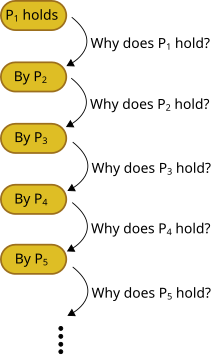
In epistemology, the regress argument is the argument that any proposition requires a justification. However, any justification itself requires support. This means that any proposition whatsoever can be endlessly (infinitely) questioned, resulting in infinite regress. It is a problem in epistemology and in any general situation where a statement has to be justified.[1][2][3]
The argument is also known as diallelus[4] (Latin) or diallelon, from Greek di' allelon "through or by means of one another" and as the epistemic regress problem. It is an element of the Münchhausen trilemma.[5]
- ^ "Foundationalist Theories of Epistemic Justification". Stanford Encyclopedia of Philosophy. Metaphysics Research Lab, Stanford University. 2018.
- ^ "Theory of Knowledge".
- ^ "University of Reading".
- ^ Nicholas Rescher, Epistemology: An Introduction to the Theory of Knowledge, p. 22, at Google Books
- ^ D. Klein, Peter (2004). "What IS Wrong with Foundationalism is that it Cannot Solve the Epistemic Regress Problem". Philosophy and Phenomenological Research. 68: 166–171. doi:10.1111/j.1933-1592.2004.tb00332.x. Retrieved 2019-12-25.